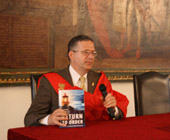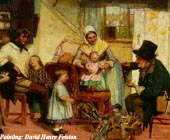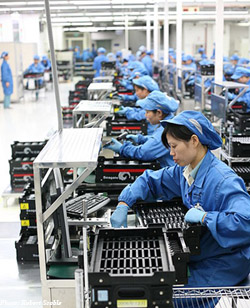 Excerpt adapted from the talk, “Wisdom: The Foundation of an Organic Christian Society” given by John Horvat II at the 2013 TFP National Conference on October 26, 2013
Excerpt adapted from the talk, “Wisdom: The Foundation of an Organic Christian Society” given by John Horvat II at the 2013 TFP National Conference on October 26, 2013
What I would like to do is concentrate on the basic premises that reflect the wisdom found in Christian civilization. By understanding these three things, you will get an idea of what we mean by organic Christian society. We can understand where we want to go.
The first principle of wisdom is rather basic. It is that any social order must be based on our human nature as living beings. It is the nature of living things to behave like living things. Society should not be organized like a machine but like a living organism. Wisdom says treat people like people.
It is all so simple or even obvious. But so accustomed are we to living in a mechanistic and socialistic society that this notion of organic society is often forgotten.
But it is so true. Prof. Plinio Corrêa de Oliveira noted that: “Today there is no field of human action that in some aspects is not modified in such a way as to impel men to act like a machine”…or (we might add) a computer.
It is something we experience daily as we are all inserted into integrated systems where all must be simplified, planned, and engineered to adapt to the machine, which ends up minimizing individuality and maximizing efficiency. When I was in university, I was for all practical purposes defined by my student number of 217301. To the American federal government, I am presently defined by my social security number. To my bank, I am a faceless barcode embedded on a magnetic strip.
In such a regime, we are reduced to depersonalized “units” to be inserted, replaced, and deleted at will in the industrial processes. We are encouraged to play our role and not to think outside or even inside the box. This can be seen in a quote from American automaker Henry Ford who said: “Why is it every time I ask for a pair of hands, they come with a brain attached?”1
And that’s the way many things tend to be organized. What is bureaucracy but a government machine that treats all people like equal objects not people. Educational programs like Common Core seek to standardize the teaching of children as if they were machines not thinking beings. What is Obamacare but the mechanization of medicine with all its 60,000 classifications of illnesses and 20,000 pages of regulations? Mass society and mass media are ways of dealing with society as it were a big machine that can be fine-tuned with modern marketing techniques.
The vision of things comes from the seventeenth century Enlightenment idea that the whole universe is just one huge machine, and God is, at best, just a mere clockmaker who winds up the clock He built and leaves the world to do what it wants.
We are not clocks but living beings. If you compare a machine and living  being, you will see, for example, a living being grows and develops at its own speed according to its own inner force that comes from the life of each cell. On the other hand, a machine is inert, operates at a determined speed, and always needs an external force, battery or motor to make each piece move or act. In a living organism, organs grow, change, and continually renew themselves in union with it. In a machine, all parts can exist outside the machine and be used interchangeably with others.
being, you will see, for example, a living being grows and develops at its own speed according to its own inner force that comes from the life of each cell. On the other hand, a machine is inert, operates at a determined speed, and always needs an external force, battery or motor to make each piece move or act. In a living organism, organs grow, change, and continually renew themselves in union with it. In a machine, all parts can exist outside the machine and be used interchangeably with others.
To apply this to our theme: In an organic society, a person is treated as an integral part of society like a member of the family; in a mechanistic society the individual is an interchangeable cog in a giant organization or industry.
And so, wisdom says treat people like people. We need to return to our human nature. We must stop the abuse of technology over men. Machines have their role in society but they are there to serve and be controlled by men, to integrate themselves into our culture and not dominate it.
Thus, we should not treat each other like cogs in a machine. Rather, we need to celebrate the fact that life is not an assembly line but a journey that is full of unpredictable and spontaneous development full of vitality and moods, nuance and tendencies, poetry and passion. Life brings with it pondered choices, creativity, and rhythms that no machine can imitate.
And so, an organic society is one that is in sync with our human and organic nature. From the exuberant element of life, there springs forth unique systems of art, styles of life, socio-political institutions, and economic models that differ from the rigid and soulless central planning and one-size-fits-all solutions so prized by socialists and big government bureaucrats.
We must also note that this does not only apply to individuals but to society  as a whole.
as a whole.
The socialist vision of society says society is merely a collection of individuals. Organic Christian society holds that we are social beings that normally perfect ourselves by living in community. Our social nature rejoices in being together with others where qualities are complemented by others and defects are counterbalanced. We must reject the individualistic concept which says each person is a fully self-sufficient, autonomous, and perfect being in need of no other. We must reject the claims of Thomas Hobbes, who describes life in society as a “war of every man against every man.”
Imagine a singer only wants to sing his part. He wants no connection with the choir. He never even wants to perform before an audience. He may be technically correct, but he will be a horrible singer since it is in that communion between singer and choir; chorus and audience that the singer refines his skills and corrects his shortcomings. This is an example of mechanistic society.
But a true organic society is the opposite. We want to be part of the choir because this enhance not destroys our personality. The more developed we become, the more our social nature impels us to seek our perfection in association with others, to help and be helped by others. An organic society is a true society oriented towards a common good as each person and group works to achieve their own perfection.
As Heinrich Rommen writes: “Life in community enlarges, exalts, and perfects the individual person, and cures the shortcomings and wants that are connected with mere individuality and isolation.”2
That is why an organic society celebrates the fact that just inequalities exist since the qualities of others help us in our quest for perfection. That is why an organic Christian society is an ordered hierarchical society since the inequalities of talents, abilities, and circumstances create the conditions for individuals or groups to have specific roles.
 Leo XIII in his encyclical Quod Apostolici Muneris claims this hierarchy works like the members and organs in a body. He affirms: “He [God] appointed that there should be various orders in civil society, differing in dignity, rights, and power, whereby the State, like the Church, should be one body, consisting of many members, some nobler than others, but all necessary to each other and solicitous for the common good.”3
Leo XIII in his encyclical Quod Apostolici Muneris claims this hierarchy works like the members and organs in a body. He affirms: “He [God] appointed that there should be various orders in civil society, differing in dignity, rights, and power, whereby the State, like the Church, should be one body, consisting of many members, some nobler than others, but all necessary to each other and solicitous for the common good.”3
And so our first principle of organic Christian Society insists that we be true to our nature as living, social and rational beings. We must reject a mechanistic vision of life.
1 (Matthew Stewart, The Management Myth: Why the Experts Keep Getting it Wrong [New York: W.W. Norton, 2009], 57).
2 Rommen, State in Catholic Thought, 136.
3 Leo XIII, encyclical Quod Apostolici Muneris (1878) in The Papal Encyclicals, vol. 2, p. 13, no. 6.


